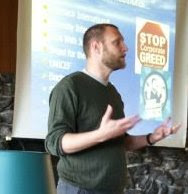1 Cor 9:16-23
"...I may make the gospel free of charge...” (v18)
This is something of a play on words for Paul, and differently for us. For Paul, the phrase “free of charge” has a double meaning: he is not paid by the people to be an apostle, and that the gospel itself is a free gift of the grace of God, not something of his giving or doing. The gospel is grounded in grace – the free-giving of God.
In English, the translation itself has an additional meaning: to deliver the gospel in such a manner that it is free from accusation or charge of inconsistency, falsehood, duplicity or ulterior motive. To give the gospel integrity with/through my own living out of the gospel I preach. To make the gospel free of any charge that could be laid against it (because of my actions or representation of it).
This is important. We inevitably represent the gospel to people who are unfamiliar with us or the gospel. We as “believers” show what we believe both in what we say and in what we do – and perhaps most importantly, we show our truest selves in the relationship between what we say and what we do. We are the gospel to the world. So if we bring it couched in fear or loathing, it is a gospel of fear and contempt. If we bring the gospel at the point of a sword or gun, it is the gospel of violence and domination. If we bring the gospel through vindictiveness, gossip, condescension, vanity, self-righteousness, aggressiveness, surety, then the gospel we bring is those things.
Perhaps this is what the gospel-writer John was talking about when he meant that God is love – our gods are whatever we do, how we treat others reveals our truest god, and the God of the gospel is revealed in loving.
When Paul writes a few verses later: “I have made myself a slave to all, so that I might win more of them,” the word translated as “win” is an economic term akin to “make profit.” Another way to phrase this might be: I have met everyone on their own terms as a servant to their best selves, so that I could be profitable to them. Being of service to others – especially others who see themselves as quite different from you – is a gospel-bearing act.
It adds flavor to Paul’s declaration of being all things to all people, so that he may save some. Save, too, is an economic term – and saving for the sake of saving is a poor economic plan. But saving for some future, better use is wise indeed. Maybe this has something to do with Paul’s word choice. We aren’t saved from something, but for something, for an act, for acts of loving. That we might also make the gospel free of charge.
Labels: 1 Corinthians, Community, Midrash, Peace, Way of the Cross (Discipleship)



0 Comments:
Post a Comment
<< Home